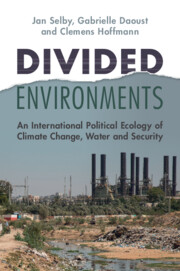9 - Transformations and Circulations
Published online by Cambridge University Press: 15 September 2022
Summary
The claim that there exists a complex ‘nexus’ linking water and other global challenges has become a commonplace of discourse on resource governance. But how should the relations between water and cognate areas be understood? This final main chapter of the book takes up this question by examining the four main relations underpinning water security and insecurity today: with trade, agricultural production, energy and capital. The chapter considers these four relations in turn, in each case providing an overall mapping of the 'transformations and circulations' that define them and an assessment of how they shape water-related (in)securities, especially in the book's five divided environments. The chapter argues that water is much more a dependent than an independent variable in nexus relations and that patterns of water (in)security are determined neither by natural availability nor market efficiencies, but instead by countries’ positionings within a structurally unequal and hierarchical capitalist world order. Against neo-liberal arguments, the chapter thus argues that contemporary capitalist nexus relations are a central part of the problem of water – and climate – security.
Keywords
- Type
- Chapter
- Information
- Divided EnvironmentsAn International Political Ecology of Climate Change, Water and Security, pp. 270 - 299Publisher: Cambridge University PressPrint publication year: 2022



